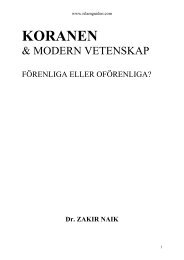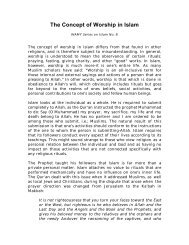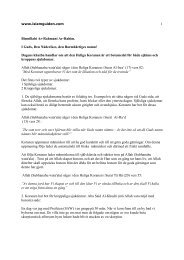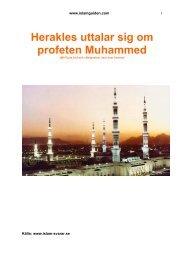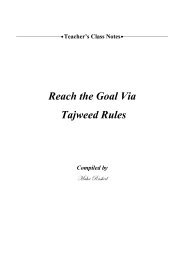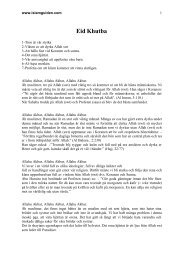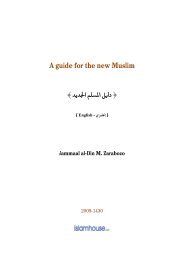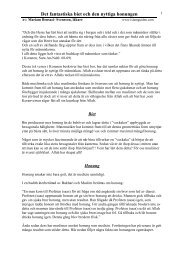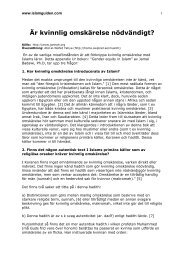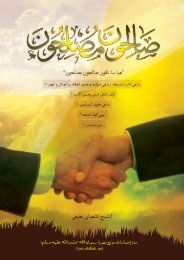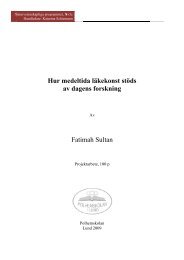The Prophet's Prayer From The beginning To The End As Though ...
The Prophet's Prayer From The beginning To The End As Though ...
The Prophet's Prayer From The beginning To The End As Though ...
Create successful ePaper yourself
Turn your PDF publications into a flip-book with our unique Google optimized e-Paper software.
[12]Saheeh - collected by Tirmidhi, Ahmad & Ibn Abi Shaibah.<br />
Later, I discovered that this hadeeth is actually da'eef: I had relied on Manaawi in declaring saheeh the isnaad of Ibn Abi Shaibah,<br />
but then I happened to come across it myself, and found that it was clearly weak, being the same isnaad as Tirmidhi and others -<br />
see my book Silsilah al-Ahaadeeth ad- Da'eefah (1783). However, its place is taken by the <strong>Prophet's</strong> saying (sallallaahu 'alaihi wa<br />
sallam), "He who relates from me a saying which he knows is a lie is indeed one of the liars", collected by Muslim and others.<br />
[13]Abdul Hayy Al-Lucknowi says in Imaam al-Kalaam fimaa yata'allaq bil-Qiraa'ah Khalf al-Imaam (p. 156), as follows: "Whoever<br />
dives into the oceans of fiqh and the fundamentals of jurisprudence with an open mind, and does not allow himself to be prejudiced,<br />
will know with certainty that in most of the principal and subsidiary issues in which the scholars have differed, the madhhab of the<br />
scholars of Hadeeth is firmer than other madhhabs. Every time I go into the branches of difference of opinion, I find the view of the<br />
muhadditheen nearest to justice - their reward is with Allaah, and He will thank them. How could it be otherwise, when they are the<br />
true inheritors of the Prophet (sallallaahu 'alaihi wa sallam), and the sincere agents of his Law; may Allaah include us in their<br />
company and make us die loving them."<br />
[14]Subki says in al-Fataawaa (1/148):<br />
"<strong>The</strong> most important affair of the Muslims is the <strong>Prayer</strong>, which every Muslim must care about and ensure its performance and the<br />
establishment of its essentials. Related to <strong>Prayer</strong> are issues on which there is consensus and there is no escaping the truth, and<br />
other issues in which the scholars have differed. <strong>The</strong> correct approach is either to keep clear of dispute if possible, or to look for<br />
what is authentically- proven from the Prophet (sallallaahu 'alaihi wa sallam) and adhere to that. When one does this, his <strong>Prayer</strong> will<br />
be correct and righteous, and included in the words of the Exalted, "So whoever expects to meet his Lord, let him work correct,<br />
righteous deeds." (Al-Kahf, 18:110)<br />
I say: <strong>The</strong> latter approach is superior, nay, obligatory; this is because the former appeoach, as well as being impossible many<br />
issues, does not fulfil his command (sallallaahu 'alaihi wa sallam), Pray as you have seen me praying, but instead leads to one's<br />
prayer being decidedly different to that of the Prophet (sallallaahu 'alaihi wa sallam).<br />
[15]<strong>From</strong> the poetry of Hasan ibn Muhammad an-Nasawi, as narrated by Haafiz Diyaa' ad-Deen al-Maqdisi in his article on the<br />
excellence of the Hadeeth and its People.<br />
[16]Baqarah, 2:213<br />
[17]Tirmidhi, Qudaa'i, Ibn Bushraan & others.<br />
[18]This is the sort of taqleed (blind following ) which Imaam Tahaawi was referring to when he said, "Only someone with partyspirit<br />
or a fool blindly follows opinion" - quoted by Ibn 'Aabideen in Rasm al-Mufti (vol. 1, p. 32 from the Compilation of his Essays).<br />
[19]al-A'raaf, 7:3<br />
[20]Ibn 'Aabideen in al-Haashiyah (1/63), and in his essay Rasm al-Mufti (1/4 from the Compilation of the Essays of Ibn 'Aabideen),<br />
Shaikh Saalih al-Fulaani in Eeqaaz al-Himam (p. 62) & others. Ibn 'Aabideen quoted from Sharh al-Hidaayah by Ibn al-Shahnah al-<br />
Kabeer, the teacher of Ibn al-Humaam, as follows:<br />
"When a hadeeth contrary to the Madhhab is found to be saheeh, one should act on the hadeeth, and make that his madhhab.<br />
Acting on the hadeeth will not invalidate the follower's being a Hanafi, for it is authentically reported that Abu Haneefah said, 'When<br />
a hadeeth is found to be saheeh, then that is my madhhab', and this has been related by Imaam Ibn 'Abdul Barr from Abu Haneefah<br />
and from other imaams."<br />
This is part of the completeness of the knowledge and piety of the Imaams, for they indicated by saying this that they were not<br />
versed in the whole of the Sunnah, and Imaam Shaafi'i has elucidated this thoroughly (see later). It would happen that they would<br />
contradict a sunnah because they were unaware of it, so they commanded us to stick to the Sunnah and regard it as part of their<br />
Madhhab. May Allaah shower His mercy on them all.<br />
[21]Ar.: halaal<br />
[22]Ibn 'Abdul Barr in Al-Intiqaa' fi Fadaa'il ath-Thalaathah al- A'immah al-Fuqahaa' (p. 145), Ibn al-Qayyim in I'laam al- Mooqi'een<br />
(2/309), Ibn 'Aabideen in his Footnotes on Al-Bahr ar-Raa'iq (6/293) and in Rasm al-Mufti (pp. 29,32) & Sha'raani in Al-Meezaan<br />
(1/55) with the second narration. <strong>The</strong> last narration was collected by 'Abbaas ad-Dawri in At- Taareekh by Ibn Ma'een (6/77/1) with<br />
a saheeh sanad on the authority of Zafar, the student of Imaam Abu Haneefah. Similar narrations exist on the authority of Abu<br />
Haneefah's companions Zafar, Abu Yoosuf and 'Aafiyah ibn Yazeed; cf. Eeqaaz (p. 52). Ibn al-Qayyim firmly certified its authenticity<br />
on the authority of Abu Yoosuf in I'laam al-Mooqi'een (2/344). <strong>The</strong> addition to the second narration is referenced by the editor of<br />
Eeqaaz (p. 65) to Ibn 'Abdul Barr, Ibn al-Qayyim and others.<br />
If this is what they say of someone who does not know their evidence, what would be their response to one who knows that the<br />
evidence contradicts their saying, but still gives verdicts opposed to the evidence! <strong>The</strong>refore, reflect on this saying, for it alone is<br />
enough to smash blind following of opinion; that is why one of the muqallid shaikhs, when I criticised his giving a verdict using Abu<br />
Haneefah's words without knowing the evidence, refused to believe that it was a saying of Abu Haneefah!<br />
[23]Ar.: haraam<br />
٦٤



